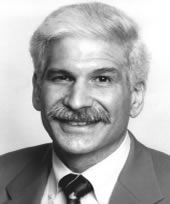|
 Home:
PCU1|2002: Edward
Messing, MD
Home:
PCU1|2002: Edward
Messing, MD
 |
 |
 |
 |
 |
Edward
Messing, MD |
 |
 |
Professor and Chairman, Department of
Urology
Deputy Director, Cancer Center
University of Rochester School of Medicine
and Dentistry |
|
 |
 |
 |
Edited comments by Dr Messing
Adjuvant hormonal therapy for men with node-positive
disease
Unquestionably, I advise men with positive lymph nodes at the time
of their prostatectomy to strongly consider adjuvant endocrine therapy.
I refer to my study and mention that it was a small study, which
has been criticized. Since the trial evaluated an LHRH-agonist,
I usually prescribe either leuprolide or goserelin in combination
with a brief course of an antiandrogen. When potency and libido
are an issue, I may consider 150 mg of bicalutamide monotherapy
and breast irradiation.
If I personally had been diagnosed with node-positive prostate
cancer, I would want adjuvant endocrine therapy. Before the results
of my study, I would have done the exact opposite. We did everything
possible to the data to attempt to disprove the survival difference
in our trial, but there was no question that it was present. Surprisingly,
few urologists in the community are initiating adjuvant hormonal
therapy in men with node-positive prostate cancer. They usually
wait until the PSA becomes detectable to start hormonal therapy.
In contrast to breast or colorectal surgeons, urologists do not
think of using adjuvant therapy with surgery. That may be the wrong
approach.
Management of patients with positive surgical
margins at prostatectomy
There are 3 potential alternatives for this type of patient: observation
until the PSA becomes detectable, radiation therapy to the prostatic
bed or hormonal therapy. In men with low-grade tumors, I would favor
external beam radiation therapy in order to save hormonal therapy
until later. For those with high-grade tumors, radiation therapy
alone may not be effective since there is a possibility of systemic
disease. Although no real data exist, I would lean towards hormonal
therapy for high-grade tumors. When libido or potency is not an
issue, I recommend standard chemical castration with an LHRH-agonist.
If the patient were potent, I would consider bicalutamide almost
exclusively. I rarely use orchiectomy. Most, but not all, men will
accept hormonal therapy. If I were the patient in this situation,
I would probably choose an LHRH-agonist unless I thought my nerves
had been preserved. Then, I would choose bicalutamide.
The Early Prostate Cancer (EPC) trials in clinical
practice
In the Early Prostate Cancer (EPC) trials, immediate bicalutamide
resulted in about a 40%-50% reduction in bone metastases irrespective
of the primary treatment — radical prostatectomy, radiation
therapy or watchful waiting. High-risk men — those with a 50%
chance of failing within a few years after prostatectomy —
should consider adjuvant bicalutamide. Men with high Gleason-grade
tumors, positive surgical margins and a large volume of disease
have an increased risk of PSA failure within 2 years. Since their
course is pretty obvious, treating those men would be worthwhile.
Management of patients with postprostatectomy
PSA failure
According to the radiation therapy literature, men should be treated
before their postprostatectomy PSA reaches 1 ng/mL. I usually offer
radiation therapy to a man whose PSA is rising at a measurable rate.
Since radiation decreases the chance of regaining continence, I
am more reluctant to radiate a patient who is incontinent. In the
high-risk patient with node-positive or high-grade disease (Gleason
grade >= 7), where the likelihood of systemic disease is increased,
hormonal therapy may be preferred over radiation therapy.
Selected References
Early Breast Cancer Trialists’ Collaborative Group. Tamoxifen
for early breast cancer: An overview of the randomised trials.
Lancet 1998;351:1451-67. Abstract
Catton C et al. Adjuvant and salvage radiation therapy after
radical prostatectomy for adenocarcinoma of the prostate.
Radiother Oncol 2001;59(1):51-60. Abstract
Leventis AK et al. Prediction of response to salvage radiation
therapy in patients with prostate cancer recurrence after radical
prostatectomy. J Clin Oncol 2001;19(4):1030-9. Abstract
Messing EM et al. Immediate hormonal therapy compared with
observation after radical prostatectomy and pelvic lymphadenectomy
in men with node-positive prostate cancer. N Engl J Med
1999;341:1781-8. Abstract
Schild SE. Radiation therapy (RT) after prostatectomy: The
case for salvage therapy as opposed to adjuvant therapy.
Int J Cancer 2001;96(2):94-8. Abstract
Walsh PC et al. A structured debate: Immediate versus deferred
androgen suppression in prostate cancer - evidence for deferred
treatment. J Uro l 2001;166:508-16. Abstract
|